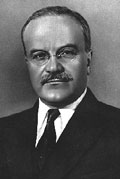| Molotov joined the Russian Social Democratic Workers' Party in 1906. He was involved in the revolutionary activities and was twice arrested by the tsar regime. In 1917 he entered the executive committee of the Petrograd Soviet and was a member of the Military Revolutionary Committee on the eve of the Bolshevik coup. In 1918 he was the chairman of the Petrograd regional council for people's economy, but then the Bolshevik Central Committee sent him to the Volga region. In a quick turn of events, he was transferred first to Nizhny Novgorod, then to Donetsk and eventually became a secretary (1920-1921) of the Central Committee of the Ukrainian Bolshevik party. The 9th congress of the Russian Bolshevik party elected him a candidate member (1920-1921) of the Central Committee and the next congress promoted him to the party elite. He attained full membership (1921-1957) on the Central Committee and the Orgburo (16 Mar 1921 - 21 Dec 1930). In addition, Molotov was elected secretary of the Central Committee (16 Mar 1921 - 21 Dec 1930) and a candidate member of the Politburo (16 Mar 1921 - 1 Jan 1926). Working in the secretariat under Joseph Stalin's supervision from 1922, Molotov became his staunch supporter against other party factions. Molotov's position earned him full membership in the Politburo (1 Jan 1926 - 5 Oct 1952). With the help of Stalin, he then assumed control of the Moscow Municipal Committee as the first secretary (1928-1929) and purged the Moscow organization of its anti-Stalin elements. When the Stalin faction expelled Aleksej Rykov from his party and state posts, Molotov was made chairman of the Council of People's Commissars of the USSR on 19 Dec 1930. He also assumed the chairmanship in the Council of Labor and Defense (19 Dec 1930 - 23 Nov 1937). As head of the Soviet government, Molotov approved all the most notorious Stalin's endeavors such as collectivization, industrialization and political purges. By the time of World War II, Molotov replaced Maksim Litvinov as people's commissar for foreign affairs (3 May 1939 - 15 Mar 1946). He negotiated the Molotov-Ribbentrop Pact (August 1939) with Nazi Germany, but in May 1941 Stalin dismissed him as head of government and assumed the office himself. Molotov remained deputy chairman (6 May 1941 - 16 Aug 1942) and then became first deputy chairman (16 Aug 1942 - 15 Mar 1946). During World War II he also served on the State Defense Committee as deputy chairman (30 Jun 1941 - 4 Sep 1945) and negotiated alliances with Great Britain and the United States. Reorganization of the Soviet ministerial structure made Molotov First deputy chairman of the Council of Ministers (19 Mar 1946 - 29 Jun 1957) and minister for foreign affairs (19 Mar 1946 - 4 Mar 1949). Though Molotov was elected a full member of the party Presidium (16 Oct 1952 - 29 Jun 1957), which replaced the Politburo in 1952, his influence in early 1950s weakened. Only Stalin's death saved him from being another defendant in a show trial. The joint session of the party Central Committee, the Council of Ministers and the Presidium of the Supreme Soviet again installed Molotov as foreign minister (5 Mar 1953 - 1 Jun 1956), but his disagreement with Nikita Hruščëv resulted in his dismissal. He was made minister of state control (21 Nov 1956 - 29 Jun 1957), but unsuccessful attempt of Molotov and other party conservatives to remove Hruščëv in June 1957 fatally ruined his career. He was mercilessly striped of his posts in June 1957 and sent to Mongolia as ambassador (1957-1960). In 1960-1962 he headed the Soviet mission to the International Atomic Energy Agency in Vienna. However, his constant criticism of Hruščëv cost him party membership in February 1962. He retired from politics and was reinstated as the party member shortly before his death in 1984. |

